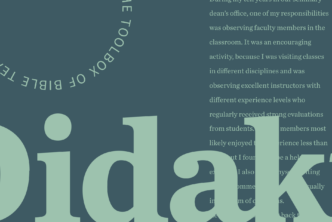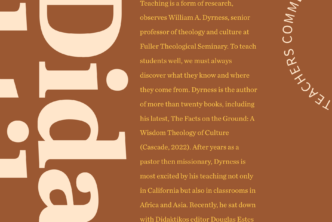By Ryan Jackson | Gordon-Conwell Theological Seminary
As a student, I always suspected adjunct professors were personae non gratae among the serious academic community. This perception, I now believe, is the impression of a sophomoric imagination.
In my lengthy career as an impoverished student— a career I might have gladly extended had the remuneration been more favorable—I avoided adjunct professors like the plague. I viewed them as an unfortunate cross between a substitute and an assistant gym teacher. They clearly are not going to be around long, and they probably can’t play in the big leagues. The exception to my rule (to avoid adjuncts) came in those cases when I cared not a whit about the subject matter of a required course. In those cases, I would sacrifice my zeal for pure and undefiled learning on the altar of semestral expediency.
Now that I have been forced from my erstwhile career path and into a more ontological epistemology (a.k.a. the “real world”), I hold a somewhat different view of the adjunct. The seeds of this rehabilitated image were planted in my own unexpectedly positive experiences with the “academic outcasts.” In a word, I discovered that adjuncts could bring an important context to the classroom that was sometimes missing in classes taught by more institutionally stable figures.
By context I mean a set of important life experiences that adjuncts often bring to the table. Adjunct professors—particularly those who are bivocational— live not only in the ethereal world of philosophy and theory, but also in the concrete world of practice. Many are forced to reconcile the highest levels of learning with experiential realities in ways that full-time academics typically do not have to address.
My own experience brings an additional layer of context to my role as an adjunct. As a full-time pastor, I live constantly in two worlds. I live in the world of the academy as well as that of the church. There are points of connection between these worlds, but they obviously are not the same.
As a pastor, I want to bring the people I have the privilege of shepherding into unspoiled pastures with undiluted waters; my primary goal is not simply to inform the mind, but to help lead toward transformation of the whole person. This concern leads me to ask questions and approach subjects from perspectives that enhance my function in the classroom. Many professors, to be sure, also aim to foster transformative growth. Scholars who can both inspire the mind and energize the soul tend to be people attuned to the vicissitudes of ordinary life. The broader communities in which adjuncts operate enrich them with helpful awareness of practical concerns.
Of course, none of this is meant to minimize the full-time scholarly community, but it could help encourage a professor of any status who might sometimes feel like an educational appendage. I have been fortunate to experience open arms from colleagues in the academy. I have also sensed relief (and sometimes surprise) from students who value the personal connection we make—a connection, I believe, made more natural by a sense of shared experience.

This article first appeared in Didaktikos, the journal of Theological Education. Didaktikos is a professor-to-professor journal that covers important advances in theological education in a user-friendly format. Subscriptions to Didaktikos are free for educators in theological education, who will also receive a 20% discount on Logos Bible Software. Go here to find out more.







